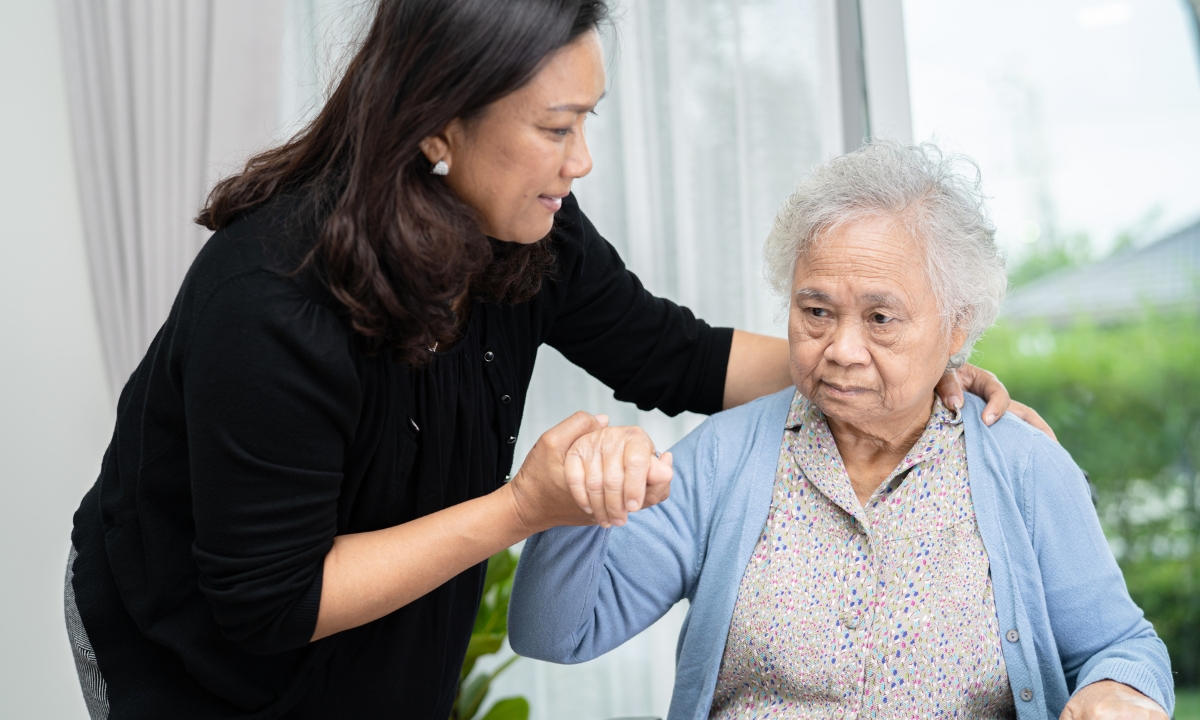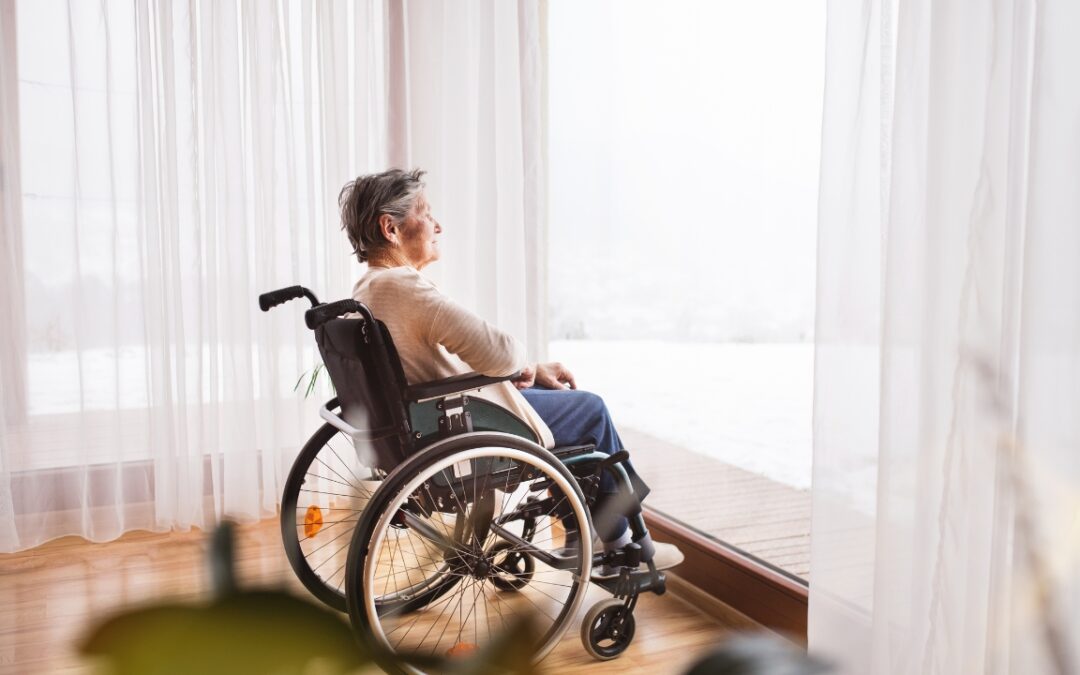Millions of seniors in the US are limited by their circumstances. Ongoing problems, including chronic illness, disabilities, and mobility issues, keep these seniors from being independent and self-sufficient. Services designed to come to them in their homes can be a lifeline for seniors who are homebound.
Meals on Wheels is a program that brings meals to vulnerable seniors, ensuring they have daily nutritious meals. But this program does more than that. It provides a network of support to citizens who often fall through the cracks of society. Homebound seniors are limited in their ability to get to the grocery store for fresh produce and cook meals, so a meal delivery service is a lifesaver. But Meals on Wheels also provides daily social interactions through volunteer drivers and offers many other resources designed for seniors.

Housebound Seniors
But what does it mean to be homebound? We can define homebound as a person who is unable to leave their home without:
- A supportive device (crutches, walker, cane, wheelchair)
- Special transportation
- Or assistance from another person
Being so limited means that many homebound seniors need assistance to leave their houses for any reason. As a result, they can easily become socially isolated, physically inactive, and experience food insecurity.
Meals on Wheels takes the health and safety of housebound individuals very seriously and works to overcome obstacles that stop seniors from living safely at home.

The Challenges of Housebound Seniors
There are so many physical and mental challenges faced by homebound older adults. Being unable to leave the house means they cannot be active, which is a big problem for seniors. Staying active helps delay many health problems and keeps muscles strong. Factors like muscle strength and flexibility play into how likely a senior is to suffer a fall and, by extension, how well they can live independently.
Being homebound and unable to travel without assistance also means that getting to places like the grocery store or the doctor’s office is extremely difficult. And, of course, being unable to get to the doctor reliably increases the risk that a chronic condition will develop or worsen without the proper care.
Suffering from isolation or loneliness also increases the chance of developing mental illnesses like depression or anxiety. Homebound seniors are incredibly vulnerable to isolation and loneliness because they can easily become cut off from their friends and family and even feel cut off from their community as a whole.
Isolation can also be dangerous because of a fall or other emergency risk. For example, if a senior falls and cannot get up on their own, there will be no one to help and no way to call for help.
There are millions of seniors in the US that are homebound. In 2019, 1.6 million adults 70 or older were considered homebound, but the number doubled during the pandemic, hitting 4.2 million homebound seniors in 2020.
Meals on Wheels – A Lifeline for Housebound Seniors
There are so many ways that Meals on Wheels addresses these problems with their meal delivery program. Between the healthy meals and wellness checks, they look out for seniors’ physical and mental health.
Meal deliveries ensure that each senior is getting enough food each day and that it’s high-quality food. This supports their overall health and alleviates worry about where their next meal will come from.
Volunteer delivery drivers perform wellness checks when they drop off the food. These volunteers make sure to take the time to check in with each recipient and ask about their lives and any help they might need. These wellness checks also provide seniors with much-needed social interaction. These homebound seniors may not get daily interaction without their meal delivery, and that can take a toll on a person’s mental health.
All of this together helps each recipient in the program feel like they are part of a larger community that cares for them and will step up and help when needed.
A survey in 2015 showed that homebound seniors who received daily meals from Meals on Wheels received very little social interaction outside of deliveries and reported less loneliness after receiving meals for 15 weeks. In addition, seniors on the waiting list but not yet receiving meals reported that they had no one to contact in the case of an emergency. And 92% of recipients reported that Meals on Wheels allowed them to remain at home instead of being moved to a group home.

The Importance of Nutritious Meals for Housebound Seniors
When someone is housebound, they cannot easily get to the grocery store to buy food for themselves. In some cases, they will only purchase frozen or easily prepared meals because they can’t cook for themselves. If no grocery stores are within walking distance and they cannot drive, seniors might be stuck buying food from corner stores and gas stations, which are mostly stocked with pre-made food. All of these options leave seniors either hungry or eating meals high in sodium and lacking the nutritional value they need to stay healthy.
Meal services, like Meals on Wheels, provide nutritious meals made using fresh ingredients that support the general health of seniors. These meal options give homebound seniors meal options that meet their nutritional needs and do not have to be prepared. These meals are designed with the help of dietitians to ensure that they are balanced and contain a seasonal variety.
Studies looking at Meals on Wheels programs across the country have shown that these programs improve the diet quality and increase the nutrient intake of recipients. They also reduced the risk of food insecurity and undernutrition.
The Role of Volunteers in Supporting Housebound Seniors
Volunteers are the backbone of Meals on Wheels. They give their time and energy to help those in need and help make the community a better place for everyone. The volunteer drivers act as the eyes and ears of the program when they deliver meals. This is because they perform a wellness check with each delivery and offer whenever help they can through the program.
Meals on Wheels volunteers don’t just deliver food to the seniors in their community. They bring valuable social interaction. And this isn’t just good for the seniors. Volunteering your time to help others is an extremely rewarding act of service. The benefits of social interaction go both ways. Volunteering makes you feel more connected to your community. Not to mention, it’s a great way to stay active and get out of the house.
Meals on Wheels programs exist all across the county, and over two million people volunteer their time to deliver meals to those in need.
Meals on Wheels of Contra Costa
Meals on Wheels is a lifeline for homebound seniors because of the challenges they face, including the risk of falls, malnutrition, and increased social isolation. Meals on Wheels works hard to address these problems through their delivery service, wellness checks, and community connections.
If you want to support Meals on Wheels of Contra Costa and our partners by giving back to the seniors in your community, there are so many donation and volunteer opportunities. The great thing about volunteering with this program is that your efforts will directly impact those in need, and you’ll see the results in the faces of the seniors receiving their meals.




